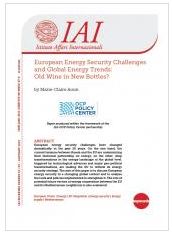
European Defence: Minilateralism is not the enemy
To access the whole publication, please click on this link.
Ifri’s conference on the New Frontiers of Energy Identified Strategic Orientations for the European Energy Union
The Ifri Center for Energy held its annual conference in Brussels on March 4th, 2015. The event gathered more than 150 participants, together with prominent policy makers, industry leaders and distinguished academics to discuss how the European energy policy can deliver effective results in light of geopolitical upheavals, technological developments and governance issues.
To download the presentations, click here
Energy Union: What's Inside the Defence Walls?
Conflicts in Ukraine and Middle East are giving resonance to the proposal for an Energy Union, originated by Poland, and, initiated by the European Commission. Indeed, access to affordable energy stands as a major concern for all EU citizens and becomes, as such, a strong political argument for the Juncker Commission to back-up an Energy Union.

Finally Something New in European Defense
The European defense debate is stepping away from the classical opposition between zealots of “Europe of Defense” and supporters of the North Atlantic Treaty Organization (NATO).

Could Differentiated Integration Unblock the CSDP?
Differentiated integration, which brings some member states together on common means and strategies, appears to be the only route possible to circumvent obstructions to a Common Security and Defense Policy (CSDP) for the 28 member states.

“Minilateralism”: A New Form of Defense Cooperation
Multilateralism has played a significant role in international cooperation.

Sharing Military Capabilities: Dead-End or Future of Defense?
The framework nations concept, elaborated in Germany, was endorsed at the North Atlantic Treaty Organization (NATO) Summit in Wales in 2014. It attempts to organize defense cooperation between a limited number of countries which share a certain cultural proximity.

The Western Balkans and the Failure of European Enlargement
The process of European enlargement has been officially suspended for five years. Yet in the western Balkans it is rapprochement with Europe that publicly underpins the majority of political policy.

European Energy Security Challenges and Global Energy Trends: Old Wine in New Bottles?
Paper produced within the framework of the IAI-OCP Policy Center partnership and presented at the international seminar "Morocco's Role in Fostering Euro-Mediterranean Energy Cooperation" organised in Rabat on 26 September 2014.
A New Era for the European Council ?
Donald Tusk is set to make his mark as the new president of the European council. How will this be felt across the other institutions that make up the EU?
Support independent French research
Ifri, a foundation recognized as being of public utility, relies largely on private donors – companies and individuals – to guarantee its sustainability and intellectual independence. Through their funding, donors help maintain the Institute's position among the world's leading think tanks. By benefiting from an internationally recognized network and expertise, donors refine their understanding of geopolitical risk and its consequences on global politics and the economy. In 2025, Ifri supports more than 80 French and foreign companies and organizations.







